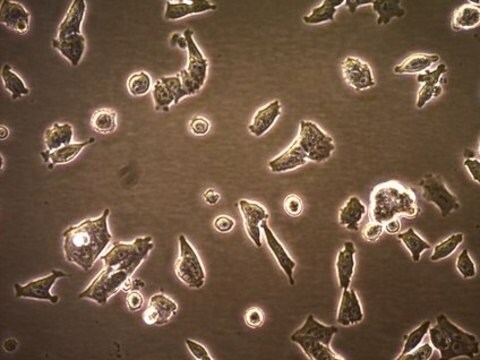10112301
P4E6 cell line
human prostate, Epithelial
About This Item
Empfohlene Produkte
Produktbezeichnung
P4E6 cell line,
Biologische Quelle
human prostate
Qualitätsniveau
Wachstumsmodus
Not specified
Karyotyp
Not specified
Morphologie
Epithelial
Produkte
Stains positive for pancytokeratin, cytokeratin 8, vimentin (weak) and chromogranin A. Prostate markers expressed include prostate specific antigen (PSA) prostate specific membrane antigen (PSMA), negative for expression of androgen receptor (AR).
Rezeptoren
Not specified
Methode(n)
cell culture | mammalian: suitable
Relevante Krankheit(en)
cancer
Versandbedingung
dry ice
Lagertemp.
−196°C
Ursprung der Zelllinie
DNA-Profil
Amelogenin: X
CSF1PO: 12
D13S317: 11
D16S539: 11
D5S818: 12
D7S820: 7,8
THO1: 7,9.3
TPOX: 8
vWA: 17,19
Nährmedium
Subkultur-Routine
Sonstige Hinweise
Haftungsausschluss
Lagerklassenschlüssel
10 - Combustible liquids
WGK
WGK 3
Flammpunkt (°F)
Not applicable
Flammpunkt (°C)
Not applicable
Hier finden Sie alle aktuellen Versionen:
Analysenzertifikate (COA)
Leider sind derzeit keine COAs für dieses Produkt online verfügbar.
Wenn Sie Hilfe benötigen, wenden Sie sich bitte an Kundensupport
Besitzen Sie dieses Produkt bereits?
In der Dokumentenbibliothek finden Sie die Dokumentation zu den Produkten, die Sie kürzlich erworben haben.
Unser Team von Wissenschaftlern verfügt über Erfahrung in allen Forschungsbereichen einschließlich Life Science, Materialwissenschaften, chemischer Synthese, Chromatographie, Analytik und vielen mehr..
Setzen Sie sich mit dem technischen Dienst in Verbindung.
